Advancing discovery and collaboration in Alzheimer's Disease and Related Dementias: From pathology to patient care
The annual Alzheimer's Disease and Related Disorders Research Day is designed to encourage collaboration and promote scientific thought among faculty, students and researchers from a wide range of disciplines across the UW–Madison campus. Mark your calendar for Alzheimer’s Disease and Related Disorders Research Day 2021, when we will host a diverse array of AD and ADRD presenters as well as networking opportunities.
March 17-18, 2021
12:00 - 5:00 p.m. each day
this two-day event will be held virtually
Meet our keynote speaker
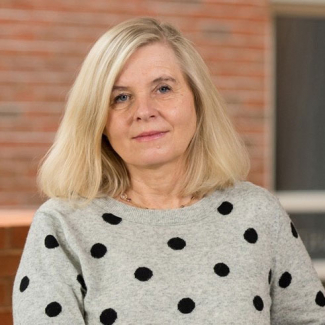
Maiken Nedergaard, MD, DMSc, is professor of neurosurgery, neurology and neuroscience and co-director of the Center for Translational Neuromedicine and Division of Glial Disease and Therapeutics at the University of Rochester Medical Center, as well as professor of glial cell biology and co-director of the Center for Translational Neuromedicine at the University of Copenhagen.
Dr. Nedergaard will offer the keynote presentation "Brain Fluid Transport — A Role in Neurodegeneration?" at 12:20 p.m. CST on March 17. (See full event Agenda below.)
Dr. Nedergaard is a pioneer in the field of neuroglial signaling and the leading figure in glial biology and pathophysiology. She was the first to show that astrocytes can transmit calcium signals to neurons; that astrocytes regulate inhibitory neurotransmission; that they communicate by purinergic signaling; that in the live brain they are activated by sensory stimulation; and that they regulate cerebral perfusion. Nedergaard also showed that astrocytes control the extracellular ion composition and thereby by a simple, yet powerful mechanism, can control neural circuit activity. Her collaborative studies revealed that the size and complexity of astrocytes increases across phylogeny, and that engraftment of human astrocytes enhances the cognitive performance of mice. Clinically-trained, she has identified a role of astrocytic pathology in spinal cord injury, epilepsy, ammonium toxicity, glioma invasion and activation of astrocytes in deep brain stimulation. Yet, her notable discovery is of the (glia-lymphatic) glymphatic system, a brain-wide fluid clearance system. She showed that the glymphatic system is activated during sleep and clears waste metabolites. Glymphatic transport declines in aging, chronic diseases, and sleep disturbances, thus linking its failure to an increased risk of dementing illness.
Her most recent work has highlighted glymphatic transport as the basis for acute post-ischemic cerebral edema, a revelation that has breathed new life into modern therapeutic approaches. In sum, Nedergaard’s work has revealed that astrocytes are active participants in higher brain function and critical causal contributors to brain disease, while laying out clear paths to fundamentally new therapeutic avenues going forward.
Registration
These event has passed.
Agenda
Day 1: March 17, 12:00 p.m. – 5:00 p.m.
Day 1 will offer scientific presentations from researchers on topics under our event theme Advancing discovery and collaboration in Alzheimer's Disease and Related Dementias: From pathology to patient care. The day will conclude with a virtual Poster Session.
- 12:00 p.m. Opening Remarks
The opening remarks will be presented by Barbara Bendlin, PhD, Wisconsin ADRC Research Education Component (REC) Leader, and Robert Golden, MD, Dean of the UW School of Medicine and Public Health.
- 12:10 p.m. Research Update
Sanjay Asthana, MD, founding director of the Wisconsin ADRC, will present the Wisconsin ADRC Research Update.
- 12:20 p.m. Keynote Address: "Brain Fluid Transport — A Role in Neurodegeneration?" by Maiken Nedergaard, MD, DMSc
Maiken Nedergaard, MD, DMSc, is professor of neurosurgery, neurology and neuroscience and co-director of the Center for Translational Neuromedicine and Division of Glial Disease and Therapeutics at the University of Rochester Medical Center, as well as professor of glial cell biology and co-director of the Center for Translational Neuromedicine at the University of Copenhagen.
Dr. Nedergaard is a pioneer in the field of neuroglial signaling and the leading figure in glial biology and pathophysiology.
Image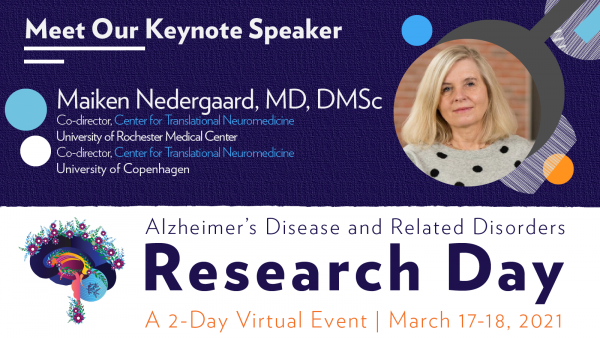
- 1:15 p.m. Presentation by Mariana Pehar, PhD: "Upregulation of FABP7 Induces a Pro-inflammatory Response in Astrocytes: Implications for Alzheimer's Disease”
- Image
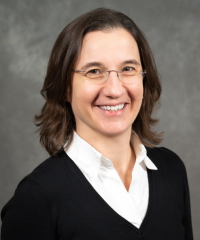
Maria Pehar, PhD "Upregulation of FABP7 Induces a Pro-inflammatory Response in Astrocytes: Implications for Alzheimer's Disease”
Mariana Pehar, PhD, is assistant professor in the UW Department of Medicine Division of Geriatrics and Gerontology. The main goal of Dr. Pehar’s research program is to understand the molecular mechanisms linking aging to the development of neurodegeneration, with the aim to identify new therapeutic targets for the prevention and treatment of neurodegenerative diseases.
Dr. Pehar is part of the Biology of Aging research team at the Geriatric Research Education and Clinical Center (GRECC) at the Madison VA. Dr. Pehar received her MSc and PhD degrees in neuroscience from the University of the Republic in Uruguay, and she completed her postdoctoral training at the University of Wisconsin-Madison/Madison-VA in Dr. Puglielli’s lab. Dr. Pehar was then recruited by the Medical University of South Carolina (Charleston, SC) as assistant professor, and in January 2020 she moved back to the University of Wisconsin-Madison. Her research focuses on elucidating the molecular mechanisms leading to neuronal degeneration in aging and pathological conditions, with emphasis in AD and Amyotrophic Lateral Sclerosis. With a combination of cellular, molecular and biochemical approaches, together with the use of transgenic mouse models, Dr. Pehar’s research has identified potential mechanisms of astrocyte-mediated neurotoxicity. The overall goal of her research program is to develop neuroprotective therapeutic strategies using astrocyte neurotoxicity as the main target.
- 1:35 p.m. Lightning Presentations
"Effect of Protein Restriction on Metabolic Health and Cognitive Function in a Mouse Model of Alzheimer's Disease"
Reji Babygirija, MS, earned a master's degree in biology and is a second-year PhD student in the Cellular and Molecular Biology program.
"Communication Behaviors that Manifest as Episodes of Lucidity in Persons Living with Dementia: A Scoping Review"Hannah Belay is an undergraduate student in Cognitive-Communicative in Aging and Neurodegenerative Disorders Laboratory (CCANDL).
"Associations in Alzheimer's Disease Between Intracranial Vascular Metrics from 4D-Flow MRI and β-Amyloid and Tau PET"
Leonardo A. Rivera-Rivera, PhD, is a neuroimaging scientist in the Wisconsin ADRC.
"Relationships Between Well-being and Cognitive Function among Native American, Black, and White Participants in the Wisconsin Alzheimer's Disease Research Center"
Mary F. Wyman, PhD, is a clinical psychologist, clinical adjunct associate professor, and Advanced Fellow in Geriatrics.
- 2:05 p.m. Break
- 2:15 Presentation by Lindsay Clark, PhD: "Sharing Personal Biomarker Results with Cognitively Healthy Research Participants"
- Image
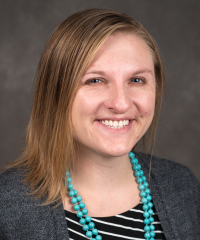
Lindsay Clark, PhD "Sharing Personal Biomarker Results with Cognitively Healthy Research Participants: What We Are Learning from the Alzheimer’s Biomarker Survey and Amyloid Disclosure Study"
Lindsay Clark, PhD, is assistant professor in the UW Department of Medicine Division of Geriatrics and Gerontology and an investigator in the Wisconsin ADRC.
Dr. Clark is a clinical neuropsychologist. Her clinical service focuses on assessment of cognitive disorders in rural populations through the UW Sauk Prairie Outreach Clinic and the Madison VA Virtual Geriatrics Clinic, as well as assessment and management of Veterans with dementia in the Madison VA Cognitive Care Clinic. Her interdisciplinary clinical research program aims to improve and expand access to early diagnosis and care of ADRD, with specific research projects focused on developing effective strategies to disclose AD risk-related information and validating tele-neuropsychological tools for dementia diagnosis.
- 2:35 p.m. Presentation by Tobey Betthauser, PhD: "Progress Toward Quantifying the Temporal Progression of Events in Alzheimer’s Disease"
- Image
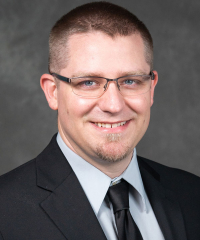
Tobey Betthauser, PhD "Progress Toward Quantifying the Temporal Progression of Events in Alzheimer’s Disease"
Tobey Betthauser, PhD, is assistant professor in the UW Department of Medicine Division of Geriatrics and Gerontology and an investigator in the Wisconsin ADRC.
Dr. Betthauser is Biomarker Core Neuroimaging Analysis Leader in the Wisconsin ADRC. Dr. Betthauser’s PhD training and thesis focused on characterizing novel positron emission tomography ligands for imaging neurofibrillary tau pathology in Alzheimer’s disease. Dr. Betthauser’s recent research has focused on developing and evaluating novel methods that enable characterization of the temporal trajectory of Alzheimer’s disease using fluid and neuroimaging biomarkers of AD pathophysiology and applying these methods to timestamp key events in the biomarker cascade and cognition. In his talk, Dr. Betthauser will show recent results from two studies that use these methods to investigate amyloid accumulation trajectories in relation to AD specific and non-AD biomarkers, cognitive trajectories, and APOE genotypes.
- 3:00 p.m. Poster Session
Day 2: March 18, 12:00 p.m. – 5:00 p.m.
Day 2 will focus on career and science development. Core Leaders from the Wisconsin ADRC will moderate four panel discussions with experts in the field. During this unique networking opportunity, attendees will learn about the experts' paths to research and their current work. Trainees are invited to interact with our panelists, and 2-3 trainees per panel will also have the unique opportunity to participate as co-moderators.
Nominate someone (self or other) to participate as a trainee co-moderator in the event registration survey. If you’ve already registered and are interested in moderating, register again and indicate your interest. Don't miss this opportunity to connect with these ADRD mentors and learn from their expertise!
The day will end with poster awards.
- 12:00 Opening Remarks
Barbara Bendlin, PhD, Wisconsin ADRC Research Education Component (REC) Leader, will present the Day 2 opening remarks.
- 12:15 p.m. Panel Session 1 — Basic Science featuring Patrizia Casaccia MD, PhD, and Suzanne Jackowski, PhD
Panel Moderator: Luigi Puglielli, MD, PhD
Panelists:
- Patrizia Casaccia MD, PhD, professor of biology and biochemistry, director of the Neuroscience Initiative at The Graduate Center, City University of New York
- Dr. Casaccia is an internationally recognized expert in the field of epigenetics and myelination with a keen interest in the mechanisms of neurodegeneration in demyelinating disorders and regenerative strategies. Her research group pioneered the concept of epigenetic regulation of gene expression in oligodendrocytes and then extended the interest to the investigation of immune cells in patients with Multiple Sclerosis and related animal models. The research focus includes the analysis of the effect of environmental variables, such as diet, life-style, body-mass index and gut-microbiota on the epigenome and the consequences on brain health. Her group has also made important contributions to the field of neurodegeneration in Multiple Sclerosis, by delineating novel modalities of neuronal demise that may underlie the progression of clinical disability in patients, with a focus on metabolism.
- Suzanne Jackowski, PhD, retired
- Dr. Jackowski's research career spans more than 40 years. In the Biochemistry department at St. Jude, she bootstrapped her interest in coenzyme A metabolism onto membrane phospholipid synthesis. A collaboration enabled a breakthrough from bacterial into mammalian coenzyme A regulation where the team cloned the first cDNA encoding a eukaryotic pantothenate kinase by functional complementation of a bacterial genetic mutant. More recently she has focused on developing treatments for human disease. Dr. Jackowski recently retired from St. Jude. Children's Research Hospital. Her journey continues as an advisor for CoA Therapeutics, Inc. and as an appointed member of the Rare Disease Advisory Council for the Governor of Tennessee
Image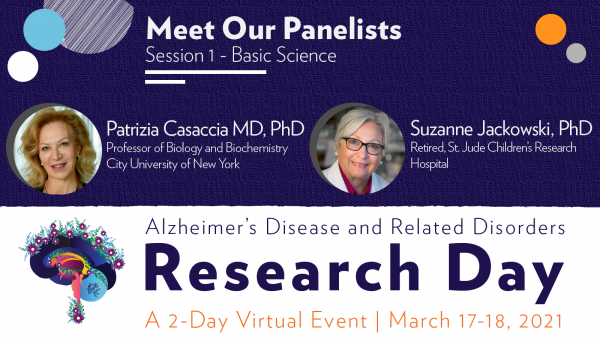
- Patrizia Casaccia MD, PhD, professor of biology and biochemistry, director of the Neuroscience Initiative at The Graduate Center, City University of New York
- 1:15 p.m. Panel Session 2 — Community-Based Outreach featuring Jennifer H. Lingler, PhD, MA, CRNP, FAAN, and Susan L. Stark, PhD, OTR/L, FAOT
Panel Moderator: Dorothy Farrar-Edwards, PhD
Panelists:
- Jennifer H. Lingler, PhD, MA, CRNP, FAAN, professor and Vice Chair of Research, Department of Health and Community Systems, University of Pittsburgh – School of Nursing
- Dr. Lingler is a professor and has been on faculty at Pitt’s NIA-funded Alzheimer Disease Research Center for over 10 years and currently directs the Center’s Outreach, Recruitment and Engagement Core, and co-leads the Research Education Component. Her research focuses on psychosocial and ethical issues in dementia care and research, with current and recent projects testing approaches to promoting diversity in ADRD research and examining patient and family decision-making around biomarker testing for Alzheimer’s disease.
- Susan L. Stark, PhD, OTR/L, FAOT, associate professor, Washington University in St. Louis
- Dr. Stark is an associate professor of Occupational Therapy, Neurology and Social Work and co-director of the TL1 predoctoral training program at Washington University. Dr. Stark’s research focus in on how the environment influences the occupational performance and participation of community-dwelling older adults with chronic conditions. The goal of her work is to support aging in place at home and to prevent falls. She conducts clinical trials and implementation studies among community-dwelling older adults (including medically underserved older adults).
Image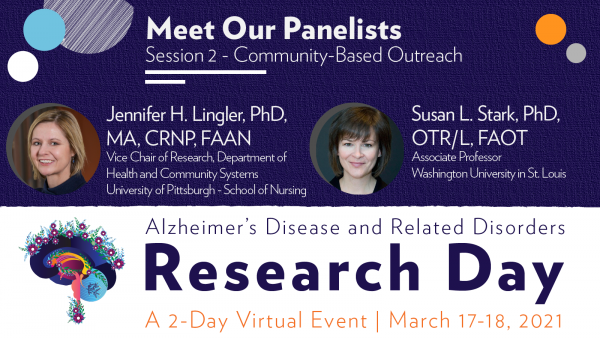
- Jennifer H. Lingler, PhD, MA, CRNP, FAAN, professor and Vice Chair of Research, Department of Health and Community Systems, University of Pittsburgh – School of Nursing
- 2:15 p.m. Panel Session 3 — Neuroimaging featuring Liana G. Apostolova, MD, MSc, FAAN, and Prashanthi Vemuri, PhD
Panel Moderator: Barbara Bendlin, PhD
Panelists:
- Liana G. Apostolova, MD, MSc, FAAN, professor in neurology, radiology, Indiana University School of Medicine
- Dr. Apostolova is the Barbara and Peer Baekgaard Professor of Alzheimer’s Disease Research at Indiana University School of Medicine. Dr. Apostolova is a prolific researcher focused on the early symptomatic and pre-symptomatic stages of AD and on the development and validation of sensitive imaging and genetic biomarkers for AD and other dementing disorders. Dr. Apostolova is the Lead Principal Investigator of the Longitudinal Early-Onset Alzheimer’s Disease Study (LEADS) – a multisite national consortium focused on early-onset AD, a rare form of Alzheimer’s that affects middle-aged individuals.
- Prashanthi Vemuri, PhD, Mayo Clinic
- Dr. Vemuri is an associate professor and an imaging researcher in the Mayo Clinic Study of Aging. She has a broad background in engineering and clinical neuroscience, with specific training and expertise in imaging of neurodegenerative disorders. Her areas of research are 1) Investigating mechanisms through which protective and risk factors influence AD imaging biomarkers and outcomes and 2) Developing and validating imaging-based biomarkers to improve the understanding and management of Alzheimer's disease and cerebrovascular disease.
Image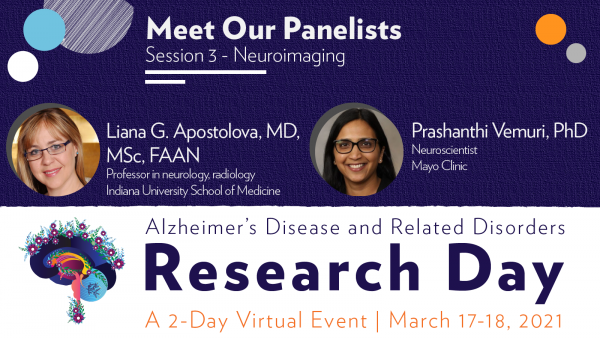
- Liana G. Apostolova, MD, MSc, FAAN, professor in neurology, radiology, Indiana University School of Medicine
- 3:15 p.m. Panel Session 4 — Clinical and Biomarker Research featuring Suzanne Schindler, MD, PhD, and Michelle Mielke, PhD
Panel Moderators: Cynthia Carlsson, MD, MS, and Sterling Johnson, PhD
Panelists:
- Michelle Mielke, PhD, professor of neurology and epidemiology, Mayo Clinic
- Dr. Mielke, PhD, works as a translational epidemiologist to further understanding of the etiology and epidemiology of neurodegenerative diseases. One focus of her research is the identification of fluid biomarkers for the diagnosis, prediction, and progression of Alzheimer's disease and other neurodegenerative diseases. Her work, in both CSF and blood, has emphasized the utility of lipids, total tau, phosphorylated tau, neurofilament light, and inflammatory markers. Another focus of Dr. Mielke’s research is on understanding sex and gender differences in the development and progression of Alzheimer’s disease and of other aging-related conditions. She directs the Mayo Clinic Specialized Center of Research Excellence (SCORE) on Sex Differences.
- Suzanne Schindler, MD, PhD, neurologist, Washington University in St. Louis
- Dr. Schindler is a clinical neurologist and neuroscientist who performs research on Alzheimer disease. The primary focus of her work is using fluid biomarkers to predict if and when cognitively normal individuals will develop symptoms of Alzheimer disease dementia. She also sees patients with memory concerns in a weekly clinic and attends on the neurology consult service. She has been involved in several clinical trials for Alzheimer disease, including the first prevention drug trial for Alzheimer disease. Dr. Schindler received a K23 career development award from the National Institute on Aging to study fluid biomarkers of Alzheimer disease.
Image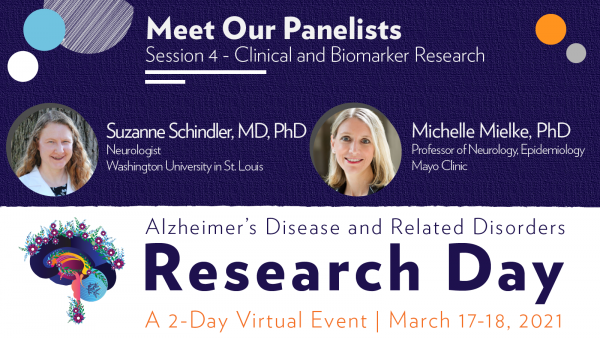
- Michelle Mielke, PhD, professor of neurology and epidemiology, Mayo Clinic
- 4:15 p.m. Break
- 4:30 p.m. Poster Awards and Closing Remarks
Poster Awards and Closing Remarks will be offered by Barbara Bendlin, PhD, and Sanjay Asthana, MD.
Thank you to the Asthana Family Alzheimer’s Disease Memorial Fund for supporting the Alzheimer’s Disease & Related Disorders Research Day Poster Session. Dr. Sanjay Asthana created this fund in honor of his father, Madan Mohan Sahai Asthana.
Virtual Poster Session
The deadline for the Alzheimer’s Disease and Related Disorders Research Day 2021 virtual poster session has passed. The poster session will be held Wednesday, March 17, 3:00 - 5:00 p.m.
Selected applicants will be notified the week of February 22, 2021.
Awards will be given for the following categories: Best Undergraduate Research Poster; Best Graduate Student or Research Specialist Poster; and Best Fellow, Post Doc, or Research Scientist Poster. This year, we are introducing a Fan Favorite Poster award that will be chosen through a voting process open to our registrants. Poster award winners will receive $150. Poster award winners will be announced on Thursday, March 18, at 4:30 p.m.
For questions regarding the poster session, please email Sheryl Spensley.




